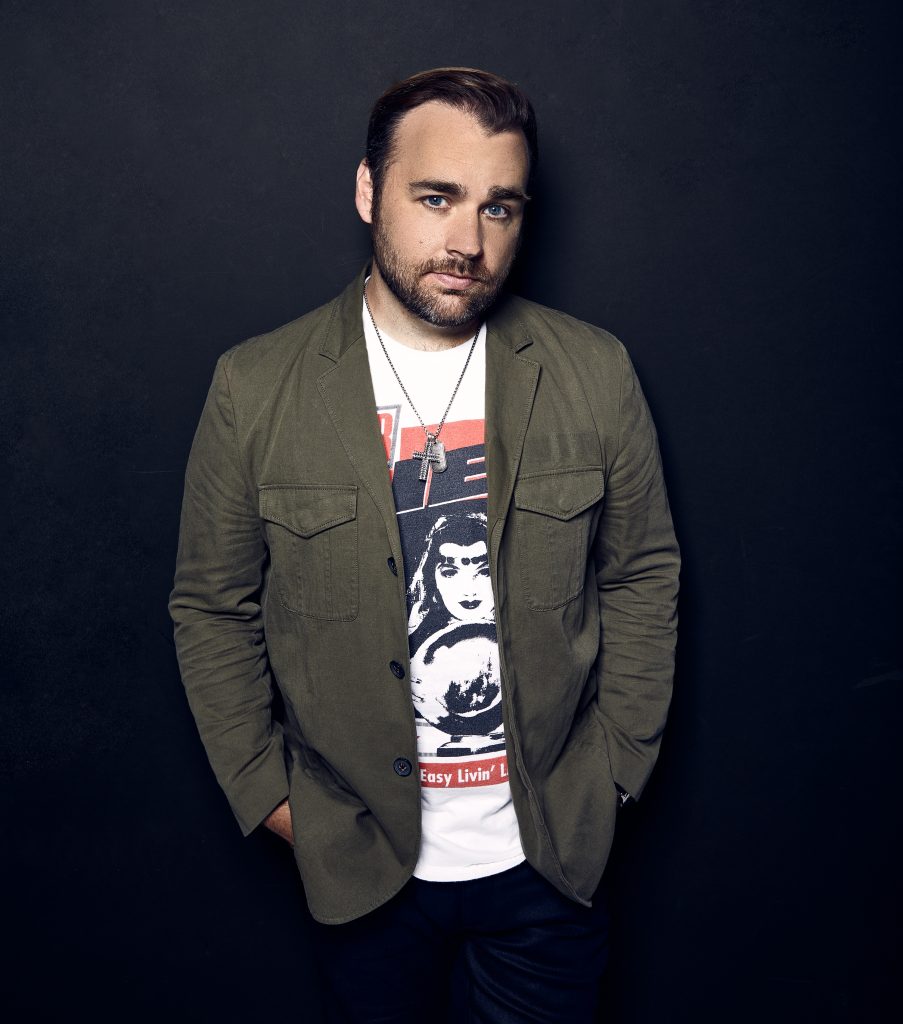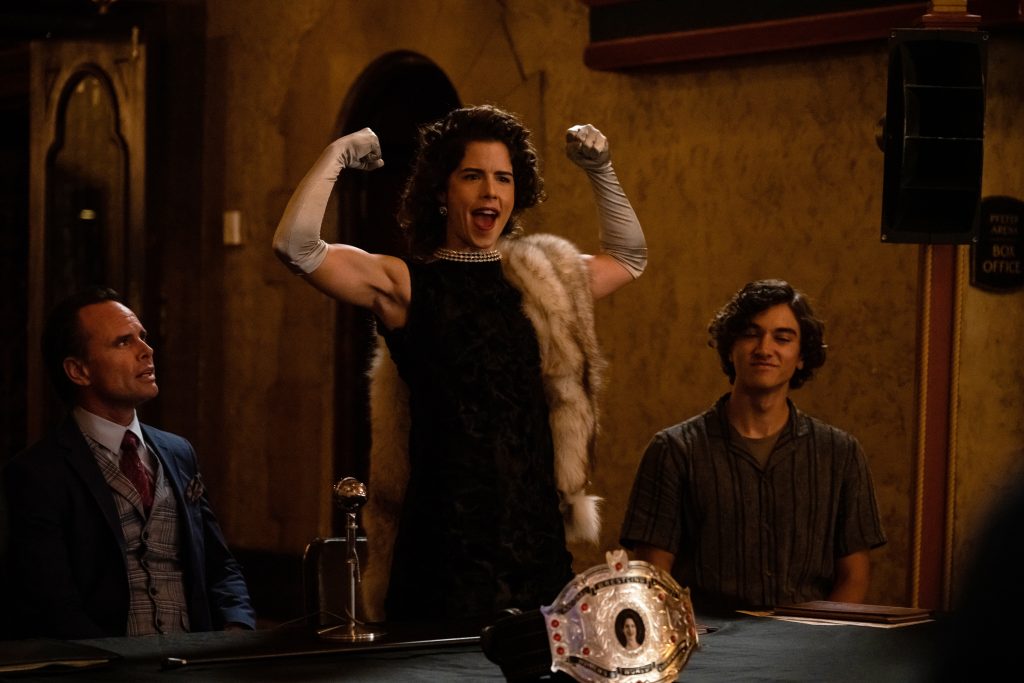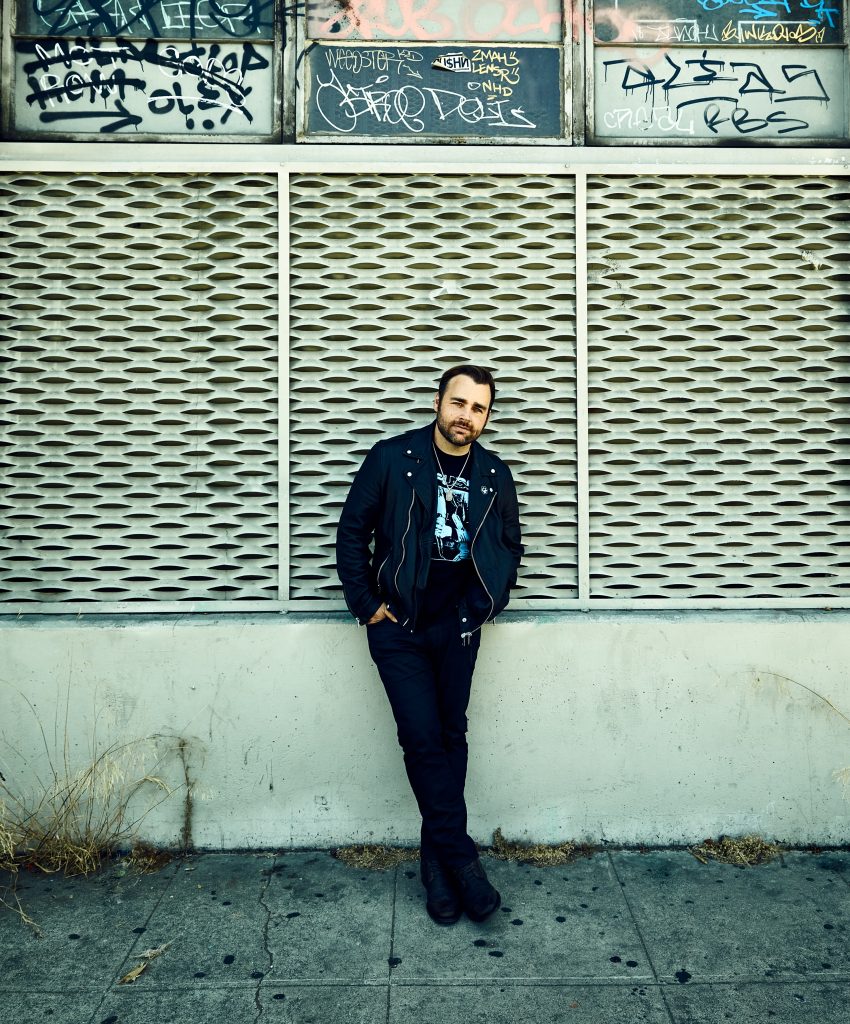
Photo by Storm Santos
Record label founder-turned-director Ash Avildsen’s film, Queen of the Ring, chronicles the life and legacy of mid-20th century professional wrestler Mildred Burke, the world’s first million-dollar female athlete. Adapted from Jeff Leen’s 2009 book, The Queen of the Ring: Sex, Muscles, Diamonds, and the making of an American Legend, the film not only depicts Burke as a trailblazer for women in sports, but also tells the tale of a single mother raising her son while pursuing love and her lifelong passion for wrestling.
Moves had a chance to sit down with Avildsen to talk about the film, what inspired him to tell Burke’s tale, and how forging a relationship with his estranged famous father — Oscar winning director John Avildsen (Rocky, The Karate Kid) — before his death imbued his work with a profound sense of purpose and authenticity.
Moves: Your film, Queen of the Ring, explores a powerful, often underrepresented story in sports history. What drew you to this specific narrative?
Ash Avildsen: I was so enchanted by the book and Mildred’s story that I couldn’t put it down. It was one of the fastest books I had ever read in my life. I have an affinity for powerful true stories that are largely forgotten by society. When I really dove into the life of Mildred Burke and how much of a cultural impact she had in her time, it felt like such a travesty that neither I nor anyone I knew had ever heard of her. Seeing her resilience as a single mother, an athlete, an underdog, and a girl trapped in a boy’s club with the odds constantly against her made me feel so inspired and motivated to make her known again.
Moves: You’ve said storytelling is your greatest passion—how did this film allow you to tap into that passion in a way your previous projects didn’t?
AA: Because this was adapted from a nonfiction book, it truly was a whole new ride. I’ve learned so much from making this film. It was incredibly challenging and emotionally grueling to decide what to include and what to omit from an incredible 20+ year career that encompasses so many people, moments, and themes. Now, when I watch it, I only see all the flaws, things I would have done differently if I were starting again from scratch. That said, I am incredibly proud of the movie and the performances. It warms my heart to see such a strong throughline of audience and critical praise for Emily and Francesca as Mildred and Mae. And, of course, seeing the people who truly love the movie as it is, and the ending landing so well, makes it a little easier to sleep at night when I keep myself up, going over the never-ending “What if I had done this instead of that?” in my mind.
Moves: Having worked in both music and film, how do you approach the creative process in these two industries differently? Is there a particular method you use to switch between the two mindsets?
AA: I’m a big believer in a saying I heard years ago: “If it’s real, the world will feel.” That’s my mantra, whether I’m working on a song with an artist or a performance with an actor. Whether it’s someone singing a lyric or delivering a line, I always focus on whether I believe them or not – in how it’s delivered, what’s being said or sung, and how it’s being said or sung. Does the person feel genuinely connected to the words and the moment? Then comes the process of determining which takes to keep for the final song or the final cut. There are a lot of similarities between crafting a song and making a film, though I will say that moviemaking is eons more difficult than album-making in terms of what you have to go through to complete a project.
Moves: Building a relationship with your father as an adult must have been profound. How did this newfound bond change the way you view legacy, both in your personal life and through the stories you want to tell as a filmmaker?
AA: Growing up with his last name, knowing he was my dad, loving his movies, but feeling total rejection from him as a child, was a complete and total head fuck. I can’t even begin to describe the juxtaposition of emotions that came with such an uncanny position to have as a kid. But I can say this, going from someone who was once close to changing his last name out of resentment and heartbreak to now feeling proud of it, wanting to carry it on, and relight the flame—has been one of the most cathartic experiences of my life. I now have my own son, who carries my last name, and being the dad I never had, raising him from birth (he’s almost three now), is the most beautiful thing in my life. I am so grateful I met my father, became best friends with him, learned from him, healed the wounds, and now have a son of my own. It really is a story that needs to be told. They say, “Write what you know”, maybe I’ll start on this script. 🙂

Emily Bett Rickards as champion professional wrestler, Mildred Burke. Photo courtesy of Sumerian Films.
Moves: Your relationship with your father is a powerful story on its own. How did reconnecting with him later in life change the way you approach your work?
AA: He instilled some great lessons in me about how to handle a protagonist. His biggest successes all share a common throughline, making the audience truly love the main character as an underdog and casting that character perfectly. Look, I’m a sucker for inspiring movies with a main character you can’t help but root for, and a big payoff at the end. I think I accomplished both of those with Queen of the Ring, between Emily’s performance and the main event. There are plenty of things I would have done differently when adapting the book into a screenplay, but one thing I wouldn’t change is Emily as Mildred, or where I chose to end the story. (The book continues for another 100+ pages.) I believe the way we told Mildred Burke’s story in the film is how she would have wanted it. It was designed to be a PG-13 movie that families could enjoy, one where neither parents nor kids would feel disconnected or bored, because it really is this fascinating fairy tale that just happens to be true.
Moves: Queen of the Ring deals with themes of perseverance and the personal struggles of its lead character. Do you see parallels between Mildred’s journey and your own, both in your music career and in filmmaking?
AA: Yes. She had a dream, and with the odds stacked against her, she refused to stay down. She refused to quit, no matter how many times a person or society told her she was being unrealistic. I know that’s a cliché we hear all the time, but she embodied it with such resilience and tenacity because it was about so much more than just the physicality of the goal. It was culture. It was society. It was family. It was abuse. It was a stereotype. At one point, it was literally the law itself. And to make it all that much more difficult, she was a single mom who had also grown up with a single mom. I don’t care what anyone says, life is much harder without a loving father at home. Period.
Moves: After completing this film, and given today’s political climate, is it more important now than ever to tell stories like Mildred’s? To tell stories of powerful women?
AA: I don’t want to say it was more important or powerful then versus now. I’d say it was most important when Mildred actually did it, when she changed culture forever, but it’s still wildly important today to ensure these stories aren’t forgotten. Both young and old generations should continue finding inspiration from truth, not just fiction.
Moves: With Queen of the Ring making waves in the festival circuit and generating buzz, how do you plan to continue pushing the boundaries in filmmaking, especially with the success of this film behind you?
AA: I just hope to get better with every film I make and ensure that the audience feels like it was worth sitting in a dark room for two hours when they reach the end credits. I don’t want to limit myself to one style or genre of storytelling, but I do want to respect the audience’s time, delivering endings that make them feel something while keeping them engaged with memorable scenes throughout the entire story. I feel like that’s part of the Avildsen brand that my dad established with his most successful movies. But he had plenty of duds too—films that didn’t deliver. Luckily, he’s remembered for his hits, not his misses. 🙂 I say that to remind anyone reading this that nobody bats 1.000, and it’s really fn hard to win as an artist—in any medium, not just film. But like Mildred, if you believe in what you’re doing and you have a dream, just keep fucking going.

Photo by Storm Santos
Moves: We live in an era where independent filmmakers and musicians can have a much more direct relationship with their audiences. What advice do you have for creatives trying to navigate both the music and film industries today?
AA: Find out who your audience is, and never stop working on how to reach them, connect with them, and make them feel like a part of what you’re creating.
Moves: Your career has always had this DIY, self-made spirit. Do you feel like that outsider mentality still fuels your work today?
AA: Yes, in the creative sense, if there’s a song or a story I want the world to know, I will find a way to get it out there. And in the business sense, by not letting roadblocks or inexperience be the reason I don’t reach for something or try to do something. I may mess up along the way, but at this point, my whole career has been about learning as I go. And while it may take longer than other approaches, I truly believe it’s the best way to learn.
Moves: What’s the most important lesson you hope audiences take away from this movie?
AA: Life is hard. Life is not perfect. Relationships are not perfect. Dreams have highs and lows — but two things we must always remember: Family is the most important thing we have and that doesn’t have to be by blood. And that as long as you believe in yourself, you can keep going. And even if you don’t believe in yourself but someone else does that you love, they may be the one to push you to stay in the fight.
QUEEN OF THE RING can be found on the following streaming platforms: Amazon Prime, Apple TV, DirecTV, Dish, Fandango, Google play, iNDEMAND, Shaw (Rogers Xfinity TV), Telus, Vubiquity, and Xbox
